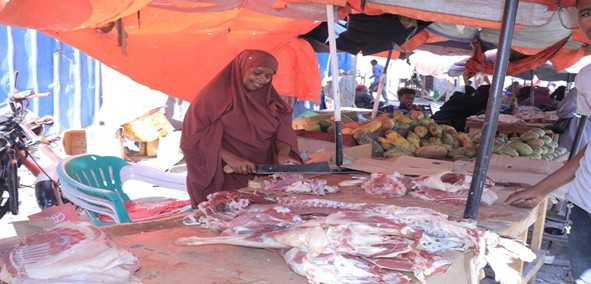Sharifo Osman, a mother of four living in Mogadishu, is one of many small-scale entrepreneurs in Somalia working hard to build a better future through business. She started her butchery with just a few dollars borrowed from friends and family. But like many microbusinesses, it wasn’t long before she hit a wall.
“I had the customers, but I couldn’t keep up with demand,” she says. Her equipment was limited, her working space was basic, and most of the money she made went right back into the daily running of the business. Profit margins were thin. Growth felt out of reach.
That changed when a friend told her about IBS Bank, a partner financial institution under the Finance for Inclusive Growth (FIG-Somalia) program. The initiative supports Somali entrepreneurs with accessible business loans tailored to small and informal businesses.
“I never thought I would not have to worry about paying my children’s school fees or paying my rent.” Sharifo Osman
“I only had to produce a business permit and tell them where my business was based,” she recalls. Within a short time, Sharifo received a $1,000 loan, her first formal financing.
“I had already planned what I wanted to do with the money,” she explains. “I bought a small freezer, renovated my butchery stand, and used the rest to increase my daily meat production.” With the upgrades, she could store more meat, maintain hygiene standards, and serve more customers each day.
The results were immediate. Sharifo’s daily sales increased, and she could finally turn a reliable profit. After deducting costs, she now earns around $200 a month, a major boost from her earlier income. More importantly, the loan gave her a sense of stability. “Now, I don’t worry about school fees or rent,” she says, visibly relieved.
Sharifo has since built a credit history with the bank, giving her access to future financing. “Every time I borrow and repay, I feel more confident,” she says. “I know I can grow this business even more.”
Her story is one of many under FIG-Somalia’s effort to promote inclusive economic growth by supporting women and small-scale entrepreneurs with simple, accessible financial tools. With continued access to credit, Sharifo is optimistic about the future: expanding her product line, hiring extra hands, and eventually opening a second stall.
